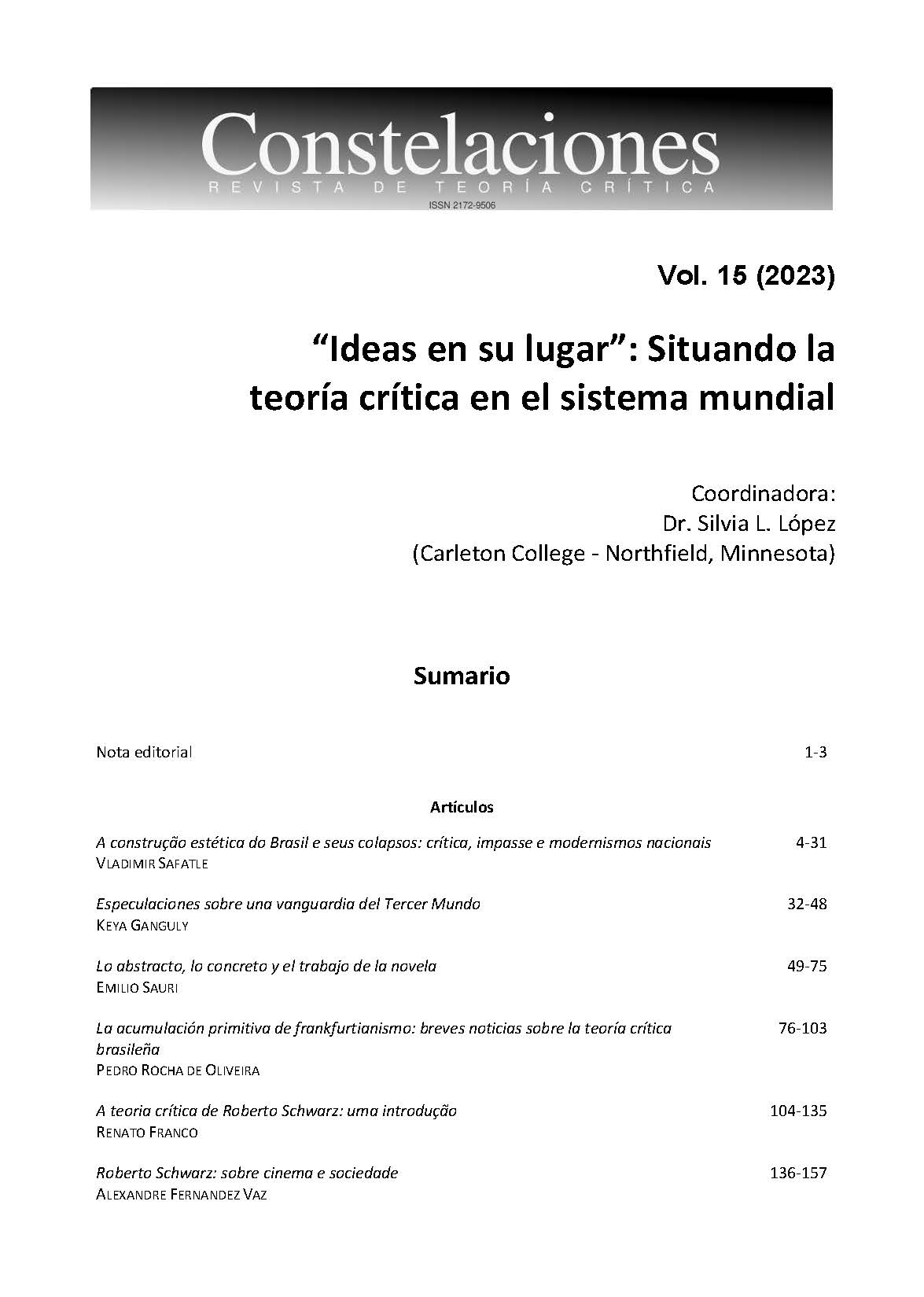Roberto Schwarz: On Cinema and Society
Keywords:
cinema brasileiro, critica dialéctica, Roberto Schwarz, Teoría CríticaAbstract
This paper aims to elucidate Roberto Schwarz's cinematic criticism, especially that refers to Brazilian films. It also considers the presence of cinema as an analytical approach in his Oeuvre. Os fuzis, by Ruy Guerra, and Cabra marcado para morrer, by Eduardo Coutinho, are the two main pieces analyzed by Schwarz, coinciding with the beginning and end of the Brazilian civil-military dictatorship. Schwarz's interpretation observes the internal dialectic of each film and their expressive force as social form. In addition, it considers the presence of Cinema Novo in his comments and analysis. The conclusions point to the strength of cinema as a corollary of the technique that supposes equivalent aesthetic constructions and political affections. They also point to the problems this carries.
Downloads
References
ADORNO, Theodor W. (1969). “Filmtransparente”. In: Ohne Leitbild. Parva Aesthetica. Frankfurt am Main: Suhrkamp, 79-88.
BENJAMIN, Walter. (2013). Das Kunstwerk im Zeitalter seiner technischen Reproduzierbarkeit. Organização de Burkhardt Lindner. Stuttgart: Reclam, 117 p.
CLAUSSEN, Detlev. (2005). “Globale Gleichzeitigkeit, gesellschaftliche Differenz.” In: D. Claussen, O. Negt y M. Werz (org.). Hannoversche Schriften 6. Frankfurt a Main: Neue Kritik.
MOURA, Flávio. (2012). “Cortina de fumaça”. Folha de São Paulo. São Paulo, 22/04/2012. https://www1.folha.uol.com.br/fsp/ilustrissima/38446-cortina-de-fumaca.shtml).
ROCHA, Glauber. (1985)). Roteiros do terceyro mundo. Org. Orlando Senna. Rio de Janeiro: Alhambra/Embrafilme. 466 p.
ROCHA, Glauber. (2019). “Oito e meio”. In: Crítica esparsa. Org. Matheus Araújo. Belo Horizonte: Fundação Clóvis Salgado, 143-146.
SCHWARZ, Roberto. (1981). “8 1/5 de Fellini – O menino perdido e a indústria”. In: A Sereia e o Desconfiado: ensaios críticos. Rio de Janeiro: Paz e Terra, 189-204.
SCHWARZ, Roberto. (1987a). “O nome do bispo: um romance paulista”. In: Que horas são? ensaios. São Paulo: Companhia das Letras, 67-70.
SCHWARZ, Roberto. (1987b). “O fio da meada”. In: Que horas são? ensaios. São Paulo: Companhia das Letras, 71-77.
SCHWARZ, Roberto. (1987c). “Existe uma estética do terceiro mundo?” In: Que horas são? ensaios. São Paulo: Companhia das Letras, 127-128.
SCHWARZ, Roberto. (1999). “Um seminário de Marx”. In: Sequencias brasileiras: ensaios. São Paulo: Companhia das Letras, 86-105.
SCHWARZ, Roberto. (2008a). “Anatol Rosenfeld, um intelectual estrangeiro”. In: O pai de família e outros estudos. São Paulo: Companhia das Letras, 119-132.
SCHWARZ, Roberto. (2008b). “Cultura e política, 1964-1968”. In: O pai de família e outros estudos. São Paulo: Companhia das Letras, 70-111.
SCHWARZ, Roberto. (2008c). “O cinema e Os fuzis”. In: O pai de família e outros estudos. São Paulo: Companhia das Letras, 29-36.
SCHWARZ, Roberto. (2012a). “Gilda de Mello e Souza”. In: Martinha versus Lucrécia. São Paulo: Companhia das Letras, 184-202.
SCHWARZ, Roberto. (2012b). “Verdade tropical: um percurso de nosso tempo”. In: Martinha versus Lucrécia. São Paulo: Companhia das Letras, 52-110.
SCHWARZ, Roberto. (2019). Seja como for: entrevistas, retratos e documentos. São Paulo: Duas Cidades/Editora 34.
STRECKER, Marcos. (2008). “O grande leitor”. Folha de São Paulo. São Paulo, 28/06/2008. https://www1.folha.uol.com.br/fsp/ilustrissima/37126-caetano-veloso-e-os-elegantes-uspianos.shtml).
VELOSO, Caetano. (2007). Verdade tropical. São Paulo: Companhia das Letras.
WERNCECK, Paulo. (2012). “Caetano Veloso e os elegantes uspianos”. Folha de São Paulo. São Paulo, 15/04/2012. (https://www1.folha.uol.com.br/fsp/ilustrissima/37126-caetano-veloso-e-os-elegantes-uspianos.shtml).
TAVARES, Zulmira Ribeiro. (2007). “Com Roberto Schwarz depois do telejornal”. In: M. E. Cevasco e M. Ohata. Um crítico na periferia do capitalismo: reflexões sobre a obra de Roberto Schwarz. São Paulo: Companhia das Letras, 138-145.
Downloads
Published
How to Cite
Issue
Section
License
Copyright (c) 2023 Alexandre Fernandez Vaz

This work is licensed under a Creative Commons Attribution-NonCommercial-ShareAlike 4.0 International License.
Authors who have publications with this journal accept the following terms:
1. Authors will retain their copyright and grant the journal the right of first publication of their work, which will be simultaneously subject to the License of recognition of Creative Commons CC BY-NC-SA 4.0 that allows third parties to share, redistribute and adapt the work provided it is for non-commercial purposes and its author and first publication in this journal is indicated.
2. Authors may adopt other non-exclusive distribution license agreements for the version of the published work (e.g., depositing it in an institutional electronic archive or publishing it in a monographic volume) provided that the initial publication in this journal is indicated.
3. Authors are permitted and encouraged to disseminate their work via the Internet (e.g., in institutional telematic archives or on their website) before and during the submission process, which can produce interesting exchanges and increase citations of the published work. (See The Effect of Open Access).
Data confidentiality
1. Constelaciones. Revista de Teoría Crítica guarantees that the data you send us will only be used to meet the requests made in this message.
2. Your data will not be passed on to third parties.
3. You may request that your data be removed from our records at any time.





